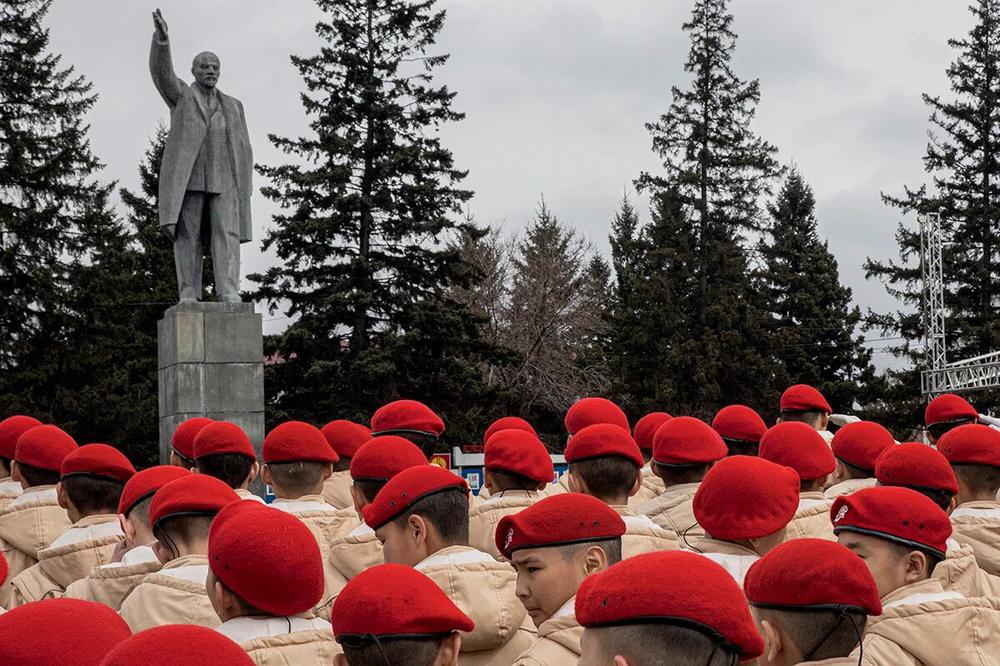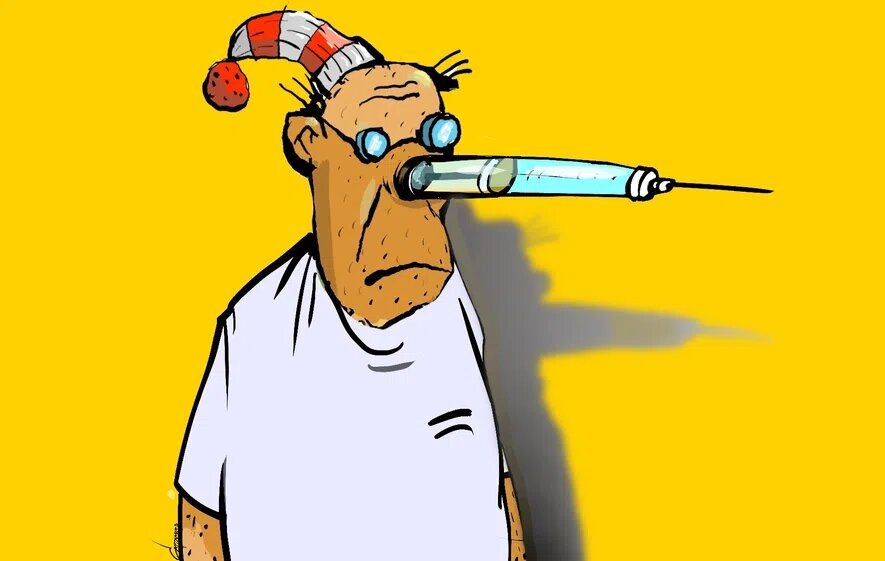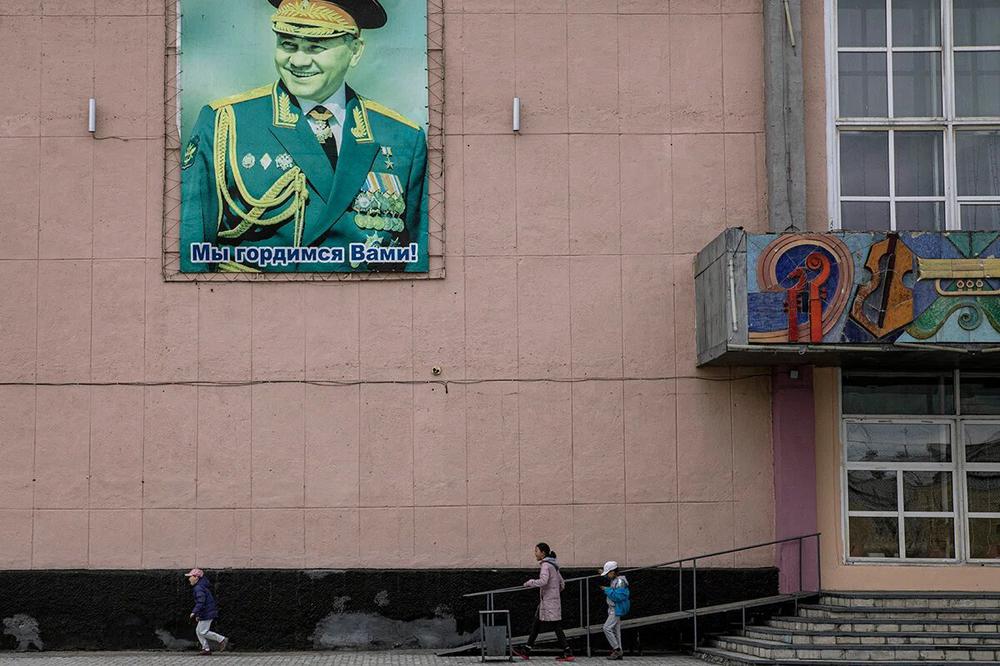
Here what’s in store for you this week:
- We lift the lid on Russia’s new vaccine and its efficacy — or lack thereof. EpiVacCorona has been rolled out despite apparently inadequate testing. Meanwhile, Covid-19 keeps taking lives of many Russians despite the ongoing vaccination campaign;
- Tuva is one of the few regions in Siberia with indiginous-majority population. It is also the country’s poorest. We brought back a dispatch explaining how Moscow keeps Tuva in a poverty trap;
- Plus, we took a trip to the Russian Arctic to meet defiant rappers who keep the Sámi language alive despite the authorities labeling it ‘separatist.’
Want to get the full story? Click the links below for full-length articles in Russian.
Shady EpiVacCorona Origins, Exposed
After Sputnik-V failed to live up to Kremlin's expectations for domination both at home and abroad, a second Russian coronavirus vaccine called EpiVacCorona started making rounds. Similar to the predecessor, the origins of the newcomer are murky, and authorities put it to use before domestic and international trials got completed. Like Sputnik-V, it has also quickly turned into a geopolitical flexing tool for the Kremlin — the first international EpiVacCorona shipments supported the Russia-friendly authoritarian regime in Venezuela.
KREMLIN CLAIMS IT TRIALLED EPIVACCORONA IN VENEZUELA. Earlier this year, it sent around 1,000 doses to test on Venezuelans. In return, the South American nation receives approximately 3 million doses of new vaccines amid the failure of the local authoritarian regime to secure a supply of internationally-vetted analogs.
EFFICACY RATE AS STRONG AS PUTIN'S ELECTION RESULTS. The creators of the EpiVacCorona vaccine, researchers at Novosibirsk's state-owned Vector Institute, modestly term their vaccine 'the safest and most effective in the world.' Reviewing their own research, they estimated its efficacy at 'around 100 percent.' The Kremlin allocated $28 million to facilitate the production.
'I WAS TOLD IT WAS SAFE.' After participating in the Vector Institute's vaccine trials, many volunteers noticed they did not have any antibodies at all, and some even fell ill with Covid-19 after receiving the vaccine. One participant, Vadim, who asked Novaya not to mention his last name, told us that he was vaccinated in early January. In February, the doctor checked his antibody levels, and Vadim was informed that he had good immunity against the virus. "Two days later, my temperature rose," Vadim said. He had coronavirus. "Turned out that 25 percent of my lungs were damaged. I was very sick."

REPORTS OF FAILURE TO PRODUCE ANTIBODIES. Another volunteer, Andrey, attended a Moscow hospital to receive his second vaccination just before the Russian new year. In the aftermath of his vaccinations, he felt fine. He was provided with a diary to monitor his own health, but he had nothing to report. A busy entrepreneur, he regarded a mass vaccine program as a means by which to get his business back in order. He didn't appear to have any antibodies and started talking to others with similar responses. He discovered around 200 others who didn't have any antibodies present in the aftermath of the vaccination.
GOVT TOLD VOLUNTEERS THEY HAVE ANTIBODIES, BUT THEY ARE 'UNDETECTABLE.' Andrey, together with other EpiVacCorona volunteers, decided to check their blood samples on their own to figure out if they have any protection against Covid-19 at all. Through amassing and anonymizing EpiVacCorona volunteers, they dispatched plasma samples mixed in with plasma samples from unvaccinated people to a lab.
"In no cases were plasma samples from those vaccinated with EpiVacCorona able to protect cells from the virus," Andrey tells us. Yet, the vaccine was still registered.
CRONYISM AND CONFLICT OF INTERESTS SURROUNDING EPIVACCORONA. Looking into the top management of the agencies developing and producing the vaccine, we've found many traces of cronyism and nepotism. For example, the company that makes the vaccine is owned by Evgeny Ryzhikov, a son of a vaccine co-creator Alexander Ryzhikov, head of biotechnology at Vector. And another co-author is Anna Popova — the director of Rospotrebnadzor, Russia's federal agency responsible for vetting the vaccine.
ON MONDAY, NOVAYA RELEASED A SPECIAL COMMEMORATIVE ISSUE DEDICATED TO THE COVID-19 SURVIVORS and their loved ones who left tributes, critiques of our coverage, and the government's handling of the virus. The accounts also displayed a deep division between society's have-nots (as well as some cynicism towards the project itself). "Famous people died in good clinics," said TV presenter Vladimir Molchanov. Over the past year, 69 of his friends and acquaintances fatally suffered due to the global pandemic.
"Unknown people, like my wonderful village neighbor, were idiotically driven to five different hospitals and later discharged to be treated at home. In the morning at home, he felt terrible, and he called an ambulance again. Finally, in the sixth hospital, he passed away," Molchanov says.
BACKSTORY. EpiVacCorona was registered in Russia in October 2020 and is one of two new Russian vaccines developed in response to the pandemic after the rollout of Sputnik-V (the other being CoviVac). However, the chemically synthesized vaccine has thus far received little global interest, and thus far, only Turkmenistan has registered it. The World Health Organization (WHO) is still awaiting an expression of interest from its developers, "Vector." All three vaccines have been pushed before the completion of international phase 3 clinical trials. Russia was the first country in the world to roll out a Covid-19 vaccine. But according to official statistics, only 9.4 million people have actually had Sputnik-V jabs – which corresponds with around 6.5 percent of the country's population. Russia's last remaining independent pollster Levada Center recently found that the vast majority of Russians are not willing to be vaccinated against COVID-19. In Russia, some 114,000 people have died from Covid-19, according to official figures. However, the actual number is likely to be much higher. Russia had one of the largest Covid-19 outbreaks globally. Our investigations have exposed the government "doctoring" both mortality and vaccination rates linked to Covid-19.
Read the EpiVacCorona exposé in full here.
Poverty Trap of Indigenous Tuva, Explained
Tuva is Russia’s most impoverished region. It is also the homeland of Russia’s defense minister Sergey Shoigu. The local indigenous population comprises the majority, but one-third lives below the poverty line. Our reporter Tatiana Vasilchuk visited the region to examine the origins of poverty trapping Russian indigenous-majority regions. We also wanted to amplify the unreported stories of local youngsters wasting away in a region thousand miles away from ultrarich Moscow and the Kremlin elites.
‘MAN HANDS ON MISERY TO MAN.’ People are angry here, Vasilchuk reports. Extreme poverty breaks people and families. Almost every second person lives below the official poverty line. Angry parents pass on their anger to their kids. A vicious cycle seems to pervade relationships in the impoverished villages. The region’s capital Kyzyl has around 100,000 people and is one of the most polluted in the country. On the outskirts is the micro-district of Levoberezhny, one of its more deprived areas. Locals are hesitant to speak to our reporter.
“Tuvans are reluctant to talk about aggression, attacks, drunkenness and generally about their problems,” writes Vasilchuk. “Sometimes, they are even offended. Sometimes they zealously justify their conditions. Especially if out-of-towners are interested.”
Поддержите
нашу работу!
Нажимая кнопку «Стать соучастником»,
я принимаю условия и подтверждаю свое гражданство РФ
Если у вас есть вопросы, пишите [email protected] или звоните:
+7 (929) 612-03-68
ALCOHOL ABUSE KEEPS RUINING IMPOVERISHED INDIGENOUS COMMUNITIES. The link between substance abuse, colonization, and poverty traps within indigenous communities is well-documented worldwide. It is the case for Tuva, too. But, with one exception — the region’s struggle remains largely untold and unknown. Alcoholism here is rampant. “People buy a bottle, move a couple of meters away from the store, and empty it in two or three minutes,” Vasilchuk writes. Alcohol abuse mixed with poverty-fueled anger breeds violence. The belligerence is understandable. One couple – a cook and a watchman at the same kindergarten– have been together for 20 years. They can’t afford much and even had to use a Covid-19 state handout to pay for essential utilities for themselves and their children. “We had a debt of 150,000 ($2,000) for water and electricity. Now only 35,000 rubles ($50) is left, thank God.” So the state not only fails its aging and sick populations but is often responsible for extorting them too.
MOSCOW HASN’T BOTHERED TO REBUILD THE REGION AFTER BIG EARTHQUAKES A DECADE AGO. A series of large ones in 2011-2012 left already dilapidated local infrastructure in ruins. It remains like this.

CRIME AND CORRUPTION ARE ENDEMIC. Sometimes, locals feel the need to intimidate one another with guns because theft is so rampant. But, unfortunately, weapons are part of the fabric of reality. “While we are talking, military equipment is passing by literally ten meters from us,” notes our reporter. Meanwhile, while the region suffers from extreme poverty, local ruling elites build lavish residences tucked away in local forests. We talked to a local journalist Almira Sendi who has recently exposed a newly-built luxurious estate reportedly belonging to the region’s governor. The owners used federal money for construction, pretending it would be a publicly accessible ski resort.
A THUG RULE. Sendi describes her coverage of the 2019 local elections as one of the scariest experiences — electoral fraud was widespread, and local ruling elites kept the voters intimidated with violence and threats. Two of the most prominent local figureheads are former head of the republic, Sholban Kara-ool, and acting head of the republic, Vladislav Khovalyg. Putin accepted Kara-ool’s resignation in April, with Khovalyg replacing him. Kara-ool had been in charge since around 2007. His successor claims he will be focusing on developing the region out of poverty, but he remains part of the same ruling elite.
THE TRADITION OF ‘POTEMKIN’S VILLAGE’ IS ALIVE AND WELL HERE. Vasilchuk visited Tuva in the aftermath of Russian Prime Minister Mikhail Mishustin’s trip to the region. When Mishustin arrived, the center was empty, Vasilchuk reports. That morning authorities cleaned the streets and took the drunks off them. The region was somewhat sanitized, and local officials tucked away signs of extreme poverty, so Moscow bigwigs had a more pleasant visit.
BACKSTORY. Russia has just 14 regions out of 85 regions where Russians are not the ethnic majority. Tuva has the fourth-smallest Russian minority among them and the smallest Russian population in all of Siberia. The region has a strong local identity and was one of the last to be subjected to imperial Russia towards the end of the 19th and early 20th centuries – later consolidated as a Soviet republic in 1944. It has remained socioeconomically deprived despite high-ranking officials’ connections to the region. However, the poverty it experiences is not unusual for the further-flung Russian regions, often telling an all-too-common tale of environmental degradation, resource appropriation, and subjugation of indigenous rights.
Read the Tuva dispatch in full and check breathtaking photojournalism done during the trip here.
Defyiant Sámi Rap, Explained
In the far northern city of Murmansk, on the fringe of the Barents Sea and inside the Arctic circle, live two musicians intent on reviving a forgotten language despite the government's attempts to hush it down. Roman Yakovlev and Yarsam Galkin rap in the ancient Sámi dialect and gained international notoriety for their efforts. This week our correspondents Sima Sverdlova and Nadezhda Yurova bring from the region a video dispatch about the Arctic indigenous pride surviving thanks to local rappers.
RECLAIMING BACK INDIGENOUS TALES AND MYTHOLOGY. Roman Yakovlev and Yarsam Galkin live in Lovozero settlement around 150km from Murmansk. The rap duo references regional indigenous myths and tales that may be lost if not for their continued oral recitation. For example, they draw on typically northern themes for one of their most popular tracks, describing a woman of interest as having 'cheeks like cloudberries' and having 'eyes like lakes.' Nearby lake Seydozero is sacred to the Sámi indigenous nation, and, according to myth, it appeared from the joyful tears of a woman.
"THE MAIN SOURCE OF INSPIRATION IS THE HISTORY AND CULTURE OF MY PEOPLE," says Yakovlev. "The motivation is that the Kildin Sami language is disappearing," he adds. Only around 1,500 of Murmansk's local indigenous population remain, and by retaining the language, there are hopes that the culture will be kept. "If we manage to establish a normative framework for the written language, it will be able to last throughout the centuries," Yakovlev tells us.
INTERNATIONAL FAME AMID STATE ATTACKS ON SÁMI RIGHTS AND LANGUAGE BACK HOME. The rappers have accrued broad acclaim, having recently reaped third place in the 'Sámi Eurovision' song contest. Yakovlev and Galkin quickly became regional celebrities. This happened on the back of rising tensions between the Kremlin and Sámi communities. Earlier, we reported on state-backed disinformation attacks on the Sámi language and the fight of a local indigenous activist against government extortion.
REVERSING THE TREND. The village of Lovozero has a population of around 3,000 with no production capabilities, no factories, no developed infrastructure. It seems that life has stopped. Environmental degradation coupled with zero job opportunities fuels the exodus of local youngsters to neighboring Scandinavian countries. Yakovlev and Galkin would like to help reverse the trend. After all, if you can survive in Tundra, you can survive anywhere.
BACKSTORY. Members of the Sámi indigenous group live across four countries: Norway, Sweden, Finland, and Russia, but they do not recognize borders. Their language is barely taught in Russia, and several dialects are recognized as extinct by UNESCO. A traditionally semi-nomadic group of reindeer herders, the Sami faced repressions and underwent forced assimilation when the Soviets colonized the Tundra for its mineral deposits and built factories in the far-north. Russian authorities have been driving indigenous people off their lands for a long time now because they are rich in oil, gas, coal, nickel, iron, platinum, and diamonds. For centuries, Moscow has been erasing indigenous culture and denied these populations their rights. There has also been a recent spike in tensions between federal authorities and indigenous communities. Some of these nations mobilize against an over-centralized state, government-backed environmental assaults on their sacral lands, and claim back their autonomy. In Kalmykia, for example, the majority-Buddhist region protested against a Kremlin-appointed mayor. In Buryatia, locals rallied against a rigged election for weeks.
Watch the documentary (and listen to some awesome Sami rap), here.
Bonus
- ‘TRADITIONAL VALUES’ KEEP FAILING RUSSIAN WOMEN, CHILDREN, QUEER PEOPLE. More than 80 percent of crimes against children in Russia are committed in the family. The state is oddly reluctant to step in, despite seemingly wanting to become involved with all other aspects of family life that do not involve violence against women and children. Often the two are combined, and young girls are subjected to sexual violence at the hands of older male relatives. This week we featured the story of Maria Kufina, who has survived a sexual abuse in the family since the age of fifteen. She started writing about it publicly. Four years later, she is still trying to recover from PTSD and wants to help women who have experienced the same thing. It was part of an ongoing pattern of fatherly neglect. “He drank all my childhood years, but it didn't bother me much. I loved him very much, much more than my mother, because he was cool,” she recalls. “Dad was constantly losing me somewhere.” At one point, she consulted an Orthodox priest about what to do if a girl had been raped. They answered, “she must repent”. Read all about how the family and state support for “traditional values” fails women at every turn, here.
- STATE DUMA PRIMARIES APPROACH. Russia nears parliamentary elections scheduled for this September. This week our reporters exposed a campaign to artificially inflate electoral support for the ruling United Russia. In some regions officials mobilize locals to participate in the party’s primaries (mostly a staged publicity show). They use a variety of coercive methods, including workplace intimidation and harassment. Read the investigation here.
Поддержите
нашу работу!
Нажимая кнопку «Стать соучастником»,
я принимаю условия и подтверждаю свое гражданство РФ
Если у вас есть вопросы, пишите [email protected] или звоните:
+7 (929) 612-03-68